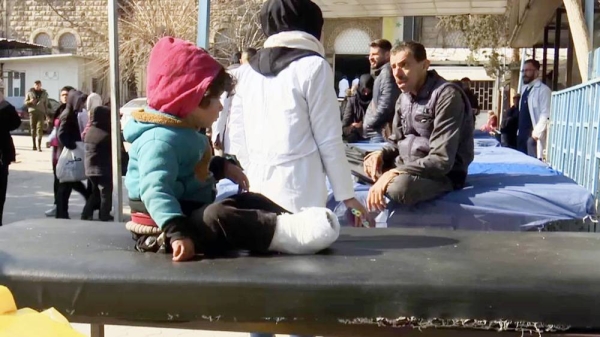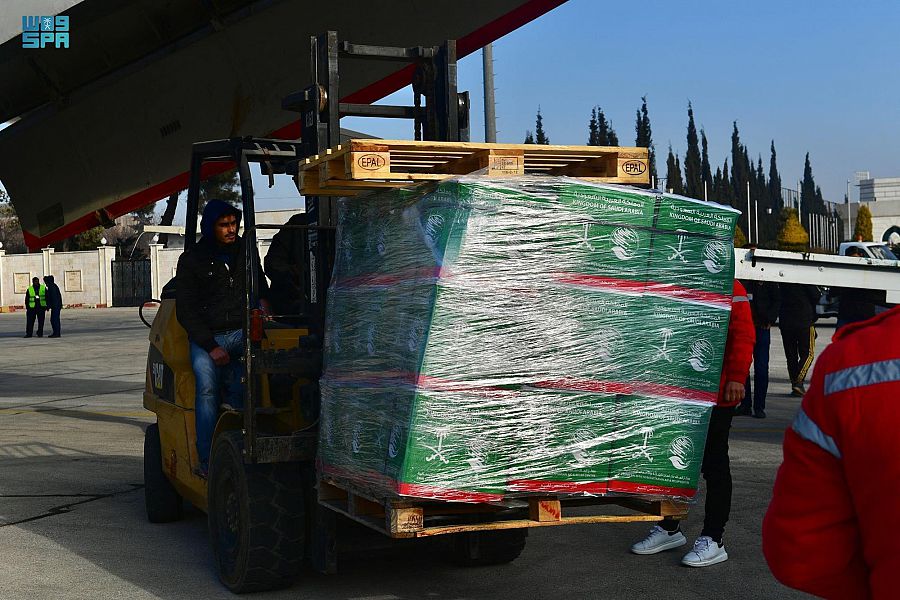
ALEPPO — Hospitals in Aleppo do not have enough room for new patients in the wake of last week’s devastating earthquake, a doctor in the Syrian city has told the BBC.
At the Al-Razi Hospital there are too many beds to fit into the wards. They reach end-to-end through corridors and into the chilly courtyard.
“We weren’t able to discharge patients from the hospitals even after treating them. The city is damaged and there are no places for them to go,” said Dr. Nizar Suleiman, the head of orthopedics.
“Huge numbers of patients came in a short period of time. We have a huge shortage in medicines, so it’s really worrying.
“For example, we suffer from a lack of medical equipment to treat fractures. We already suffer from this shortage because of the crisis, and the siege [sanctions] make it worse.”
Dr. Nizar Suleiman said there was a huge shortage of medicines due to war and sanctions
More than 4,400 deaths and 7,600 injuries have been reported in north-western Syria since a 7.8-magnitude earthquake struck neighboring southern Turkey on Feb. 6, according to the UN.
The damage to Aleppo is widespread. The BBC was given a rare opportunity by the Syrian government to visit there and speak to medical workers.
While walking through the city the BBC team tried to stay quiet, in case we could hear survivors in the broken buildings.
Over a week after the earthquake the chance of finding anyone alive in the rubble is slim. But patients keep arriving at Al-Razi Hospital.
Abu Muhammad, who spent about 24 hours trapped under the rubble, lies among other survivors on a ward. He lost his wife and three of his five children in the earthquake. He looks at a colorful photo on his phone showing his family in happier times.
“They went to Heaven, they are now with God,” he says, tearfully.
He is thankful for one thing: “God saved my mobile phone for the sake of remembering them, so at least I can look at their pictures every time I miss them.”
“I still can’t believe what happened to me. Sometimes I feel like it’s a nightmare, a bad dream. It can’t be reality.”
Tens of thousands of people are now living in churches, mosques or in public spaces and parks after losing their homes.
They told us that during the country’s civil war, which has been going on for more than a decade, they had almost expected to lose loved ones or property.
But the earthquake was so unexpected. It struck while they slept, bringing a fresh wave of suffering that they felt was somehow even harder to bear.
The government says its aid effort has been hampered by the economic sanctions that Western powers imposed in response to alleged human rights violations and other abuses committed during the country’s 12-year civil war.
The US, UK and EU deny this, saying trade in essential goods and humanitarian assistance are exempt from the sanctions.
However, even though exports of medical supplies to Syria are not specifically sanctioned, international and regional banks fearful of being punished by Western authorities have in the past been reluctant to approve the financial transactions needed by Syrians to purchase them.
On Monday, Foreign Minister Faisal Mekdad called for the lifting of all “unilateral coercive measures” during a meeting with the UN Special Envoy to Syria, Geir Pedersen, Syrian state news agency Sana reported.
The government’s key allies in the civil war — Russia, Iran and the Iranian-backed Lebanese militant group Hezbollah — have committed aid to government-controlled areas of Syria.
Aid donated by a number of other countries, including China, Sudan, Algeria, Iraq and the United Arab Emirates, has also arrived, according to Syrian state media.
The BBC saw Russian aid delivered via lorries to a hub at a church in Aleppo.
And Iran’s semi-official Fars news agency reported that a sixth shipment of Iranian aid had arrived.
Neighboring Lebanon meanwhile confirmed that it would open its ports and airports for countries wanting to send aid to Syria.
In contrast, opposition-held areas of north-west Syria have only seen a trickle of aid delivered by the UN via Turkey.
Mekdad said the Syrian government was committed to “delivering humanitarian aid to all those in need, in all areas, without any discrimination”.
But groups in the opposition enclave are not currently accepting aid from the government, fearing a propaganda victory for Damascus. — BBC












